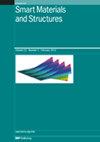具有不确定性的能量收集调谐质量阻尼器振动控制性能的鲁棒性分析
IF 3.8
3区 材料科学
Q1 INSTRUMENTS & INSTRUMENTATION
引用次数: 0
摘要
能量收集振动控制策略已被提出并应用于不同领域,包括但不限于汽车、机械和土木工程。然而,在面对来自内部和外部环境的不确定性时,很少有人对其性能的鲁棒性进行评估。能量收集调谐质量阻尼器(EHTMD)是一种集成了能量收集功能的代表性振动控制装置。本研究探讨了安装在具有多种不确定性的结构上的 EHTMD 的稳健性。首先,介绍了 EHTMD 建模、区间模型和鲁棒性评估框架。考虑了 EHTMD 所有参数的不确定性,包括机械单元、电磁阻尼器和能量收集电路。随后,对带有 EHTMD 的阻尼基准单自由度框架进行了一系列动态模拟。估算了自由振动、谐波激励和随机激励情况下的结构振动下限和上限以及产生的功率。结合第一通道理论,通过区间响应评估了 EHTMD 性能的鲁棒性。确定了影响 EHTMD 稳健性的关键因素。结果表明,使用能量收集振动控制策略取代传统阻尼器时,稳健性很有希望,从而解决了能量收集振动控制策略中一个经常受到质疑的问题。本文章由计算机程序翻译,如有差异,请以英文原文为准。
Robustness analysis for the vibration control performance of energy-harvesting tuned mass damper with uncertainties
Energy-harvesting vibration control strategy has been proposed and applied in different applications, including but not limited to automotive, mechanical, and civil engineering. However, when facing uncertainties from both internal and external environments, the robustness of its performance has rarely been evaluated. The energy-harvesting tuned mass damper (EHTMD) is a representative vibration control device integrated with the energy-harvesting function. This study investigates the robustness of an EHTMD installed on a structure with multi-uncertainties. First, the EHTMD modeling, the interval model, and the robustness evaluation framework are introduced. Uncertainties are considered for all parameters of an EHTMD, including the mechanical units, electromagnetic damper, and energy harvesting circuit. Subsequently, a series of dynamic simulations are performed on a damped benchmark single-degree-of-freedom frame with an EHTMD. The lower- and upper-bound structural vibration and generated power are estimated under free-vibration, harmonic-excitation, and random-excitation scenarios. The EHTMD performance robustness is evaluated through the interval response by incorporating the first-passage theory. The key factors in EHTMD that influence its robustness are identified. Results indicate promising robustness when using the energy-harvesting vibration control strategy to replace the conventional dampers, addressing one of the often-questioned issues of the energy-harvesting vibration control strategy.
求助全文
通过发布文献求助,成功后即可免费获取论文全文。
去求助
来源期刊

Smart Materials and Structures
工程技术-材料科学:综合
CiteScore
7.50
自引率
12.20%
发文量
317
审稿时长
3 months
期刊介绍:
Smart Materials and Structures (SMS) is a multi-disciplinary engineering journal that explores the creation and utilization of novel forms of transduction. It is a leading journal in the area of smart materials and structures, publishing the most important results from different regions of the world, largely from Asia, Europe and North America. The results may be as disparate as the development of new materials and active composite systems, derived using theoretical predictions to complex structural systems, which generate new capabilities by incorporating enabling new smart material transducers. The theoretical predictions are usually accompanied with experimental verification, characterizing the performance of new structures and devices. These systems are examined from the nanoscale to the macroscopic. SMS has a Board of Associate Editors who are specialists in a multitude of areas, ensuring that reviews are fast, fair and performed by experts in all sub-disciplines of smart materials, systems and structures.
A smart material is defined as any material that is capable of being controlled such that its response and properties change under a stimulus. A smart structure or system is capable of reacting to stimuli or the environment in a prescribed manner. SMS is committed to understanding, expanding and dissemination of knowledge in this subject matter.
 求助内容:
求助内容: 应助结果提醒方式:
应助结果提醒方式:


